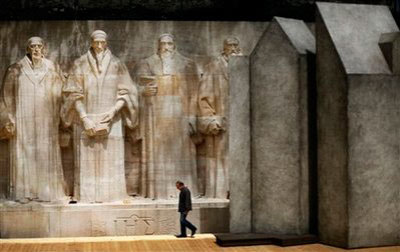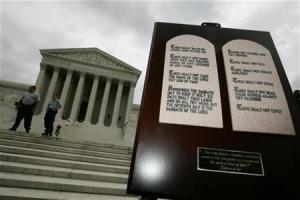Did a momentous event occur in the predestination vs. free will debate?

Even a casual observer of the Evangelical American landscape over the past half-century would be aware of the consistent, comprehensive, recurring and often combative discussions, debates and conversations about predestination versus free will concerning God’s plan and purpose for the eternal salvation of human beings.
It would be way too simplistic and misleading to outline the debate as being between polar opposites of Synod of Dort 5-point Reformed Calvinism and its polar opposite, Wesleyan Methodism.
However, in its simplest form, the Synod of Dort formulation of T.U.L.I.P. (Total Depravity, Unconditional Election, Limited Atonement, Irresistible Grace, Perseverance of the Saints) represents the theological formulation most frequently associated with the 16th century Protestant Reformer John Calvin. The opposite of these “5 points” would describe the Wesleyan-Arminian position.
As one reads or listens to the discussions and debates, it is clear that American Evangelicals understand the importance of the questions at issue, and significant numbers of Evangelical Christians embrace and advocate for both positions as well as for numerous variations between the two opposite poles. Consequently, you have “moderate” Calvinists and semi-Armenians.
In my own Southern Baptist faith tradition, you have had, and do have, numerous variations of these two theological formulations, with the exception that confessionally, Southern Baptists have always insisted on the “eternal Security of the Believer” or “once saved, always saved,” their terminology for “Perseverance of the Saints.” Personally, I have always been quite fond of the great English Victorian Baptist pulpiteer Charles Haddon Spurgeon’s terminology, the “Perseverance of the Savior.”
Such variations of understanding help explain mediating statements like the following in the Baptist Faith & Message, the Southern Baptists’ confessional statement:
“Election is the gracious purpose of God, according to which He regenerates, justifies, sanctifies, and glorifies sinners. It is consistent with the free agency of man, and comprehends all the means in connection with the end. It is the glorious display of God’s sovereign goodness, and is infinitely wise, holy, and unchangeable.”
Theology is words (logos) about God (Theos). These particular words deal with issues of critical importance such as the extent of the atonement of Jesus on the cross. Who can be saved and how much choice does an individual have concerning his eternal destiny? In a larger context, it can be seen as a form of theological “determinism” versus “free will.” Can anything happen that God has not freely predestined?
Once in a while, as brilliant and devoted people apply themselves with determination and dedication to the issue, a truly exciting, provocative, extremely helpful, and instructive study surfaces which makes a major contribution to everyone’s greater and deeper understanding of the issues under contention and discussion.
I am delighted to announce that just such an event has occurred within the last year. Dr. Robert Picirilli, long-time professor of New Testament of Welch College (in the Free Will Baptist tradition) has produced a volume that I believe will be his magnum opus.
Titled, God in Eternity and Time. A New Case for Human Freedom, this volume has been well received by most of the participants in the discussion of these issues for its originality and insight.
Dr. Picirilli has applied a lifetime of biblical scholarship to the issues involved and produced a book that makes compelling reading for anyone interested in a truly biblical theology.
Picirilli argues that to construct a truly biblical theology, one should start with the Bible itself as the best evidence of God’s plan, believing that “it is better to infer what God has decreed in eternity, from the Bible’s account of how God acted in the history … of man and the cosmos” rather than starting with the classical “decrees” and imposing them on biblical revelation.
This Scripture-first approach has produced powerful and important insights into such thorny issues as God’s will, human freedom and divine foreknowledge.
God in Eternity and Time has been well received by all segments of the Evangelical community, and its irenic spirit has been much appreciated, drawing accolades from across the Evangelical theological spectrum. Dr. Tom Nettles, longtime esteemed Southern Baptist scholar, professor and strenuous advocate for the T.U.L.I.P., described God in Eternity and Time this way:
Robert Picirilli has written … about the most important subject human beings can discuss — God and his relation to time and eternity. ... The author’s style invites conversation with the text. It is fun to read and will help one reason with humility, always deferring to Scripture over philosophy and biblically unwarranted assertions. … Picirilli takes issue with confessional Calvinism (determinism), middle knowledge, and open theism as outside the demands of the biblical text. ... I heartily recommend this book to all who want to engage a mind-clearing, spirit-elevating, theologically challenging, Bible-endearing exercise that will bear eternal fruit and give great clarity to what is at stake on the several sides of this important discussion.
And remember, Dr. Nettles is in significant disagreement with Picirilli’s conclusions.
I cannot recommend this book more highly than I do now. It is quite simply the best book on the subject I have ever read, which takes in some territory.
Dr. Richard Land, BA (Princeton, magna cum laude); D.Phil. (Oxford); Th.M (New Orleans Seminary). Dr. Land served as President of Southern Evangelical Seminary from July 2013 until July 2021. Upon his retirement, he was honored as President Emeritus and he continues to serve as an Adjunct Professor of Theology & Ethics. Dr. Land previously served as President of the Southern Baptist Convention's Ethics & Religious Liberty Commission (1988-2013) where he was also honored as President Emeritus upon his retirement. Dr. Land has also served as an Executive Editor and columnist for The Christian Post since 2011.
Dr. Land explores many timely and critical topics in his daily radio feature, “Bringing Every Thought Captive,” and in his weekly column for CP.




























